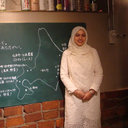Sex differentiation and risk factor evaluation in stroke patients.
Keywords
Abstract
This study was conducted to find out the possible influencing factors on stroke in two sexes. It was a descriptive type of cross sectional study, conducted on 177 stroke patients admitted in Mymensingh medical college hospital from February 2009 to March 2010. Patients were selected according to WHO stroke definition and confirmed by CT or MRI. The results of the study showed that Stroke was more common (58.19%) in male than female (41.8%), mean age of male stroke patients was 60.58±12.36 years and that of female was 63.58±13.62 years with no significant statistical sex difference. But after 70 years, females are more sufferer than male. Hypertension, Diabetes mellitus, ischemic heart disease, atrial fibrillation and dyslipidemia in male and female were equally present without significant difference, although male had a higher rate of smoking and previous stroke (p<0.05). Motor weakness was more in male than female and unconsciousness was more in female (p<0.05). Type and sub types of stroke showed no significant difference. Females had more severe stroke in terms of severity score (Scandinavian Stroke Scale) on admission. Duration of hospital stay were similar among male and female but on discharge functional scale (Modified Rankin Scale) score was higher in male (p<0.05) and in hospital mortality was higher in female (p<0.05) which was statistically significant.




